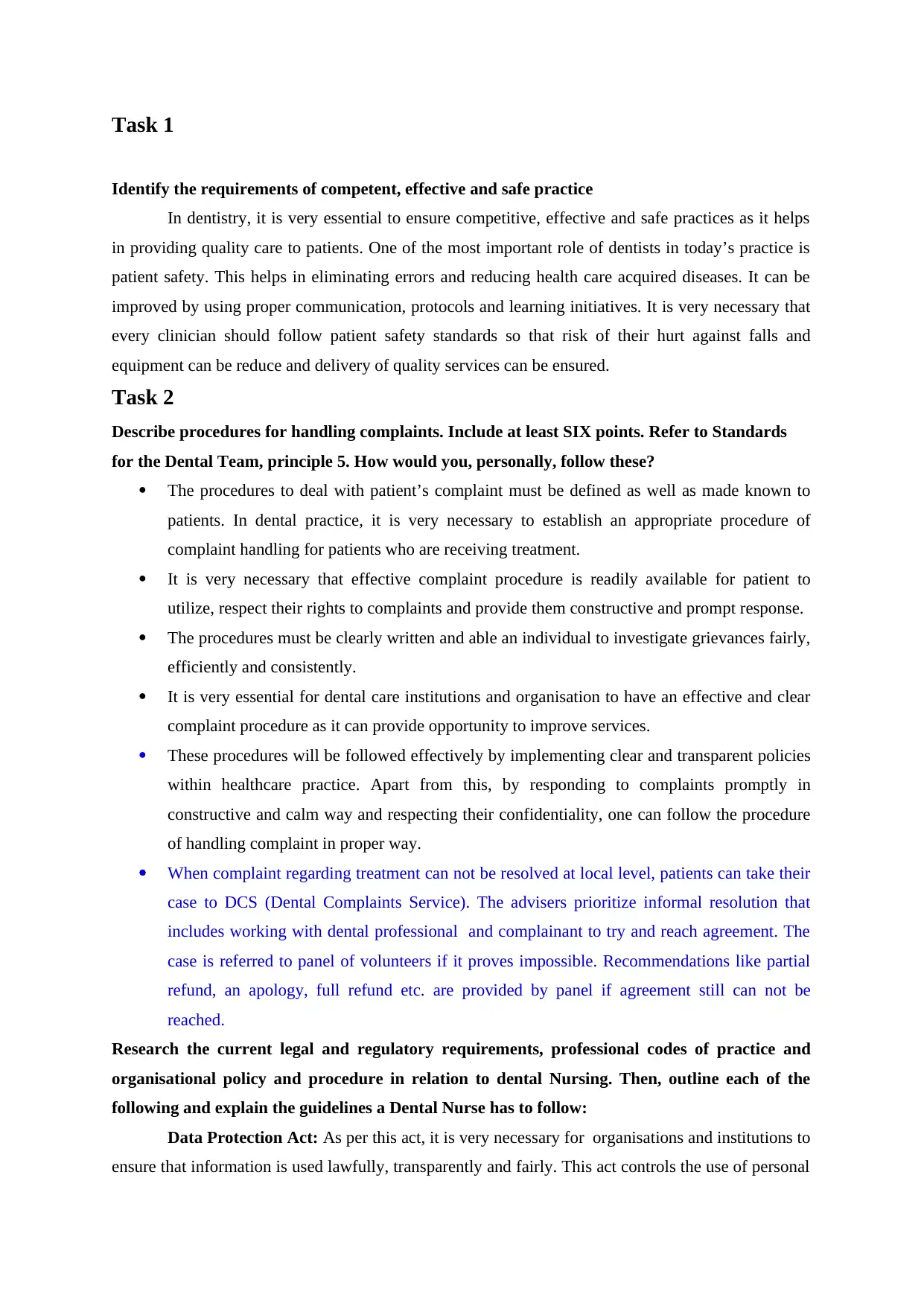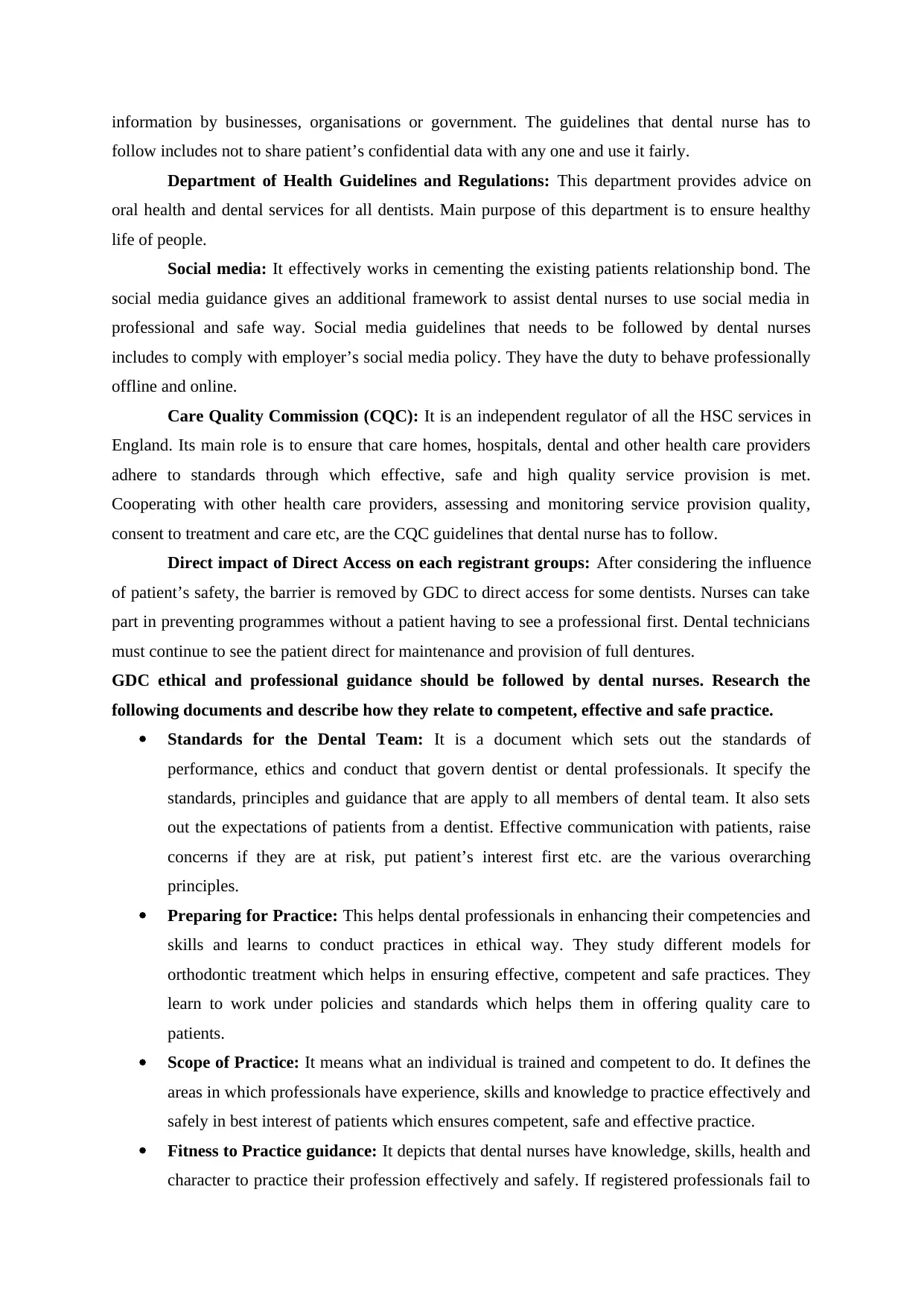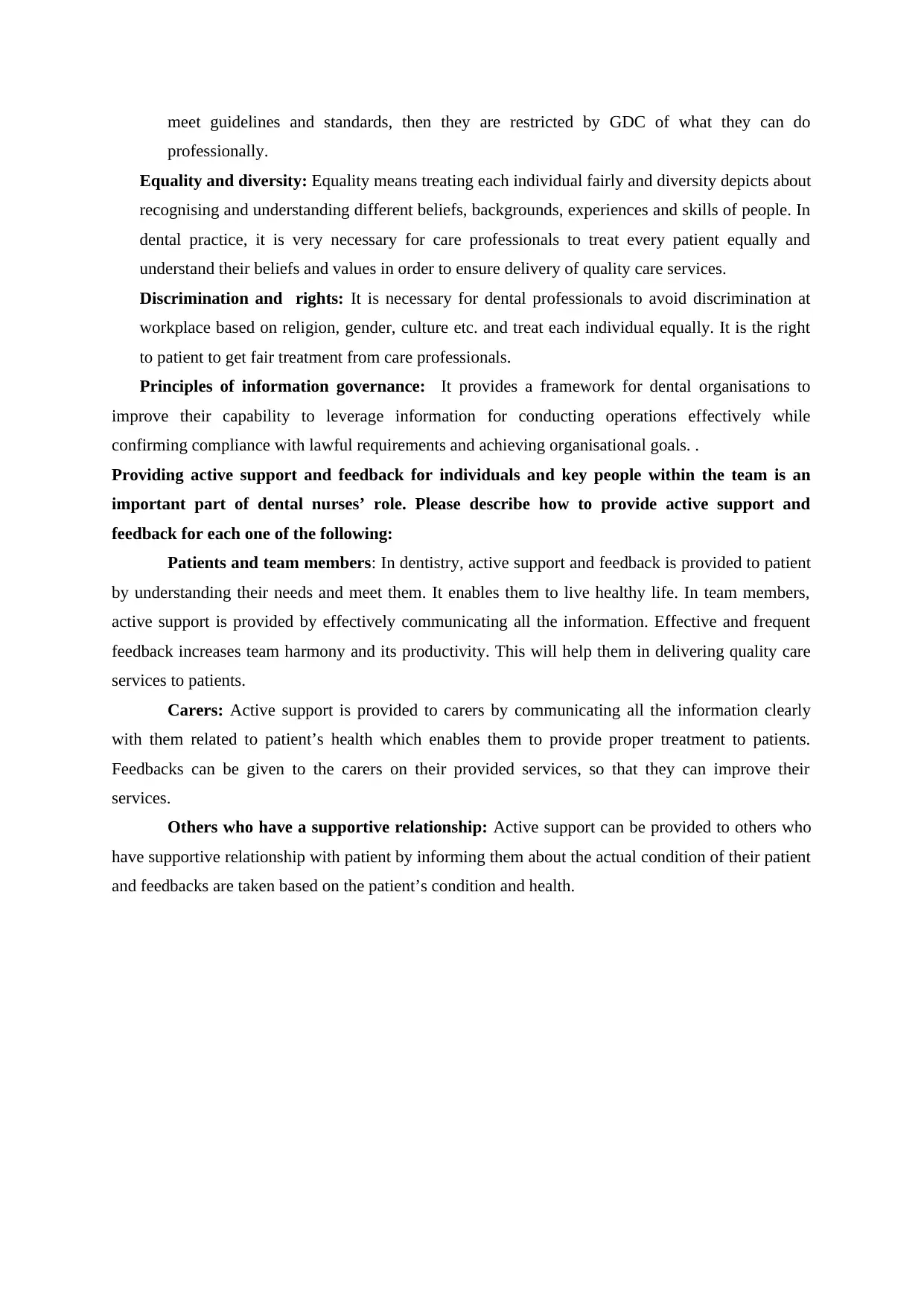DN2 Assignment: Requirements of Dental Practice and Complaint Handling
VerifiedAdded on 2021/01/09
|4
|1375
|62
Homework Assignment
AI Summary
This assignment solution addresses key aspects of competent, effective, and safe practice in dental nursing. It begins by emphasizing the importance of patient safety, outlining procedures for handling patient complaints in accordance with the Standards for the Dental Team, and detailing the importance of following these procedures. The solution then delves into legal and regulatory requirements, including the Data Protection Act, Department of Health guidelines, social media usage, and Care Quality Commission (CQC) standards. It also explores the direct impact of Direct Access on dental professionals. Furthermore, the assignment examines documents such as the Standards for the Dental Team, Preparing for Practice, Scope of Practice, Fitness to Practice guidance, and principles of equality and diversity. Finally, it describes how to provide active support and feedback to patients, team members, carers, and others with supportive relationships. This comprehensive analysis provides a thorough understanding of the responsibilities and guidelines within the dental nursing profession.

DN2
Paraphrase This Document
Need a fresh take? Get an instant paraphrase of this document with our AI Paraphraser

Task 1
Identify the requirements of competent, effective and safe practice
In dentistry, it is very essential to ensure competitive, effective and safe practices as it helps
in providing quality care to patients. One of the most important role of dentists in today’s practice is
patient safety. This helps in eliminating errors and reducing health care acquired diseases. It can be
improved by using proper communication, protocols and learning initiatives. It is very necessary that
every clinician should follow patient safety standards so that risk of their hurt against falls and
equipment can be reduce and delivery of quality services can be ensured.
Task 2
Describe procedures for handling complaints. Include at least SIX points. Refer to Standards
for the Dental Team, principle 5. How would you, personally, follow these?
The procedures to deal with patient’s complaint must be defined as well as made known to
patients. In dental practice, it is very necessary to establish an appropriate procedure of
complaint handling for patients who are receiving treatment.
It is very necessary that effective complaint procedure is readily available for patient to
utilize, respect their rights to complaints and provide them constructive and prompt response.
The procedures must be clearly written and able an individual to investigate grievances fairly,
efficiently and consistently.
It is very essential for dental care institutions and organisation to have an effective and clear
complaint procedure as it can provide opportunity to improve services.
These procedures will be followed effectively by implementing clear and transparent policies
within healthcare practice. Apart from this, by responding to complaints promptly in
constructive and calm way and respecting their confidentiality, one can follow the procedure
of handling complaint in proper way.
When complaint regarding treatment can not be resolved at local level, patients can take their
case to DCS (Dental Complaints Service). The advisers prioritize informal resolution that
includes working with dental professional and complainant to try and reach agreement. The
case is referred to panel of volunteers if it proves impossible. Recommendations like partial
refund, an apology, full refund etc. are provided by panel if agreement still can not be
reached.
Research the current legal and regulatory requirements, professional codes of practice and
organisational policy and procedure in relation to dental Nursing. Then, outline each of the
following and explain the guidelines a Dental Nurse has to follow:
Data Protection Act: As per this act, it is very necessary for organisations and institutions to
ensure that information is used lawfully, transparently and fairly. This act controls the use of personal
Identify the requirements of competent, effective and safe practice
In dentistry, it is very essential to ensure competitive, effective and safe practices as it helps
in providing quality care to patients. One of the most important role of dentists in today’s practice is
patient safety. This helps in eliminating errors and reducing health care acquired diseases. It can be
improved by using proper communication, protocols and learning initiatives. It is very necessary that
every clinician should follow patient safety standards so that risk of their hurt against falls and
equipment can be reduce and delivery of quality services can be ensured.
Task 2
Describe procedures for handling complaints. Include at least SIX points. Refer to Standards
for the Dental Team, principle 5. How would you, personally, follow these?
The procedures to deal with patient’s complaint must be defined as well as made known to
patients. In dental practice, it is very necessary to establish an appropriate procedure of
complaint handling for patients who are receiving treatment.
It is very necessary that effective complaint procedure is readily available for patient to
utilize, respect their rights to complaints and provide them constructive and prompt response.
The procedures must be clearly written and able an individual to investigate grievances fairly,
efficiently and consistently.
It is very essential for dental care institutions and organisation to have an effective and clear
complaint procedure as it can provide opportunity to improve services.
These procedures will be followed effectively by implementing clear and transparent policies
within healthcare practice. Apart from this, by responding to complaints promptly in
constructive and calm way and respecting their confidentiality, one can follow the procedure
of handling complaint in proper way.
When complaint regarding treatment can not be resolved at local level, patients can take their
case to DCS (Dental Complaints Service). The advisers prioritize informal resolution that
includes working with dental professional and complainant to try and reach agreement. The
case is referred to panel of volunteers if it proves impossible. Recommendations like partial
refund, an apology, full refund etc. are provided by panel if agreement still can not be
reached.
Research the current legal and regulatory requirements, professional codes of practice and
organisational policy and procedure in relation to dental Nursing. Then, outline each of the
following and explain the guidelines a Dental Nurse has to follow:
Data Protection Act: As per this act, it is very necessary for organisations and institutions to
ensure that information is used lawfully, transparently and fairly. This act controls the use of personal

information by businesses, organisations or government. The guidelines that dental nurse has to
follow includes not to share patient’s confidential data with any one and use it fairly.
Department of Health Guidelines and Regulations: This department provides advice on
oral health and dental services for all dentists. Main purpose of this department is to ensure healthy
life of people.
Social media: It effectively works in cementing the existing patients relationship bond. The
social media guidance gives an additional framework to assist dental nurses to use social media in
professional and safe way. Social media guidelines that needs to be followed by dental nurses
includes to comply with employer’s social media policy. They have the duty to behave professionally
offline and online.
Care Quality Commission (CQC): It is an independent regulator of all the HSC services in
England. Its main role is to ensure that care homes, hospitals, dental and other health care providers
adhere to standards through which effective, safe and high quality service provision is met.
Cooperating with other health care providers, assessing and monitoring service provision quality,
consent to treatment and care etc, are the CQC guidelines that dental nurse has to follow.
Direct impact of Direct Access on each registrant groups: After considering the influence
of patient’s safety, the barrier is removed by GDC to direct access for some dentists. Nurses can take
part in preventing programmes without a patient having to see a professional first. Dental technicians
must continue to see the patient direct for maintenance and provision of full dentures.
GDC ethical and professional guidance should be followed by dental nurses. Research the
following documents and describe how they relate to competent, effective and safe practice.
Standards for the Dental Team: It is a document which sets out the standards of
performance, ethics and conduct that govern dentist or dental professionals. It specify the
standards, principles and guidance that are apply to all members of dental team. It also sets
out the expectations of patients from a dentist. Effective communication with patients, raise
concerns if they are at risk, put patient’s interest first etc. are the various overarching
principles.
Preparing for Practice: This helps dental professionals in enhancing their competencies and
skills and learns to conduct practices in ethical way. They study different models for
orthodontic treatment which helps in ensuring effective, competent and safe practices. They
learn to work under policies and standards which helps them in offering quality care to
patients.
Scope of Practice: It means what an individual is trained and competent to do. It defines the
areas in which professionals have experience, skills and knowledge to practice effectively and
safely in best interest of patients which ensures competent, safe and effective practice.
Fitness to Practice guidance: It depicts that dental nurses have knowledge, skills, health and
character to practice their profession effectively and safely. If registered professionals fail to
follow includes not to share patient’s confidential data with any one and use it fairly.
Department of Health Guidelines and Regulations: This department provides advice on
oral health and dental services for all dentists. Main purpose of this department is to ensure healthy
life of people.
Social media: It effectively works in cementing the existing patients relationship bond. The
social media guidance gives an additional framework to assist dental nurses to use social media in
professional and safe way. Social media guidelines that needs to be followed by dental nurses
includes to comply with employer’s social media policy. They have the duty to behave professionally
offline and online.
Care Quality Commission (CQC): It is an independent regulator of all the HSC services in
England. Its main role is to ensure that care homes, hospitals, dental and other health care providers
adhere to standards through which effective, safe and high quality service provision is met.
Cooperating with other health care providers, assessing and monitoring service provision quality,
consent to treatment and care etc, are the CQC guidelines that dental nurse has to follow.
Direct impact of Direct Access on each registrant groups: After considering the influence
of patient’s safety, the barrier is removed by GDC to direct access for some dentists. Nurses can take
part in preventing programmes without a patient having to see a professional first. Dental technicians
must continue to see the patient direct for maintenance and provision of full dentures.
GDC ethical and professional guidance should be followed by dental nurses. Research the
following documents and describe how they relate to competent, effective and safe practice.
Standards for the Dental Team: It is a document which sets out the standards of
performance, ethics and conduct that govern dentist or dental professionals. It specify the
standards, principles and guidance that are apply to all members of dental team. It also sets
out the expectations of patients from a dentist. Effective communication with patients, raise
concerns if they are at risk, put patient’s interest first etc. are the various overarching
principles.
Preparing for Practice: This helps dental professionals in enhancing their competencies and
skills and learns to conduct practices in ethical way. They study different models for
orthodontic treatment which helps in ensuring effective, competent and safe practices. They
learn to work under policies and standards which helps them in offering quality care to
patients.
Scope of Practice: It means what an individual is trained and competent to do. It defines the
areas in which professionals have experience, skills and knowledge to practice effectively and
safely in best interest of patients which ensures competent, safe and effective practice.
Fitness to Practice guidance: It depicts that dental nurses have knowledge, skills, health and
character to practice their profession effectively and safely. If registered professionals fail to
⊘ This is a preview!⊘
Do you want full access?
Subscribe today to unlock all pages.

Trusted by 1+ million students worldwide

meet guidelines and standards, then they are restricted by GDC of what they can do
professionally.
Equality and diversity: Equality means treating each individual fairly and diversity depicts about
recognising and understanding different beliefs, backgrounds, experiences and skills of people. In
dental practice, it is very necessary for care professionals to treat every patient equally and
understand their beliefs and values in order to ensure delivery of quality care services.
Discrimination and rights: It is necessary for dental professionals to avoid discrimination at
workplace based on religion, gender, culture etc. and treat each individual equally. It is the right
to patient to get fair treatment from care professionals.
Principles of information governance: It provides a framework for dental organisations to
improve their capability to leverage information for conducting operations effectively while
confirming compliance with lawful requirements and achieving organisational goals. .
Providing active support and feedback for individuals and key people within the team is an
important part of dental nurses’ role. Please describe how to provide active support and
feedback for each one of the following:
Patients and team members: In dentistry, active support and feedback is provided to patient
by understanding their needs and meet them. It enables them to live healthy life. In team members,
active support is provided by effectively communicating all the information. Effective and frequent
feedback increases team harmony and its productivity. This will help them in delivering quality care
services to patients.
Carers: Active support is provided to carers by communicating all the information clearly
with them related to patient’s health which enables them to provide proper treatment to patients.
Feedbacks can be given to the carers on their provided services, so that they can improve their
services.
Others who have a supportive relationship: Active support can be provided to others who
have supportive relationship with patient by informing them about the actual condition of their patient
and feedbacks are taken based on the patient’s condition and health.
professionally.
Equality and diversity: Equality means treating each individual fairly and diversity depicts about
recognising and understanding different beliefs, backgrounds, experiences and skills of people. In
dental practice, it is very necessary for care professionals to treat every patient equally and
understand their beliefs and values in order to ensure delivery of quality care services.
Discrimination and rights: It is necessary for dental professionals to avoid discrimination at
workplace based on religion, gender, culture etc. and treat each individual equally. It is the right
to patient to get fair treatment from care professionals.
Principles of information governance: It provides a framework for dental organisations to
improve their capability to leverage information for conducting operations effectively while
confirming compliance with lawful requirements and achieving organisational goals. .
Providing active support and feedback for individuals and key people within the team is an
important part of dental nurses’ role. Please describe how to provide active support and
feedback for each one of the following:
Patients and team members: In dentistry, active support and feedback is provided to patient
by understanding their needs and meet them. It enables them to live healthy life. In team members,
active support is provided by effectively communicating all the information. Effective and frequent
feedback increases team harmony and its productivity. This will help them in delivering quality care
services to patients.
Carers: Active support is provided to carers by communicating all the information clearly
with them related to patient’s health which enables them to provide proper treatment to patients.
Feedbacks can be given to the carers on their provided services, so that they can improve their
services.
Others who have a supportive relationship: Active support can be provided to others who
have supportive relationship with patient by informing them about the actual condition of their patient
and feedbacks are taken based on the patient’s condition and health.
1 out of 4
Related Documents
Your All-in-One AI-Powered Toolkit for Academic Success.
+13062052269
info@desklib.com
Available 24*7 on WhatsApp / Email
![[object Object]](/_next/static/media/star-bottom.7253800d.svg)
Unlock your academic potential
Copyright © 2020–2026 A2Z Services. All Rights Reserved. Developed and managed by ZUCOL.





